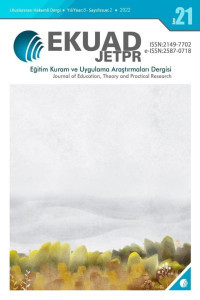Examination of English Theses Written on “Critical Thinking” in Türkiye between 2000-2021
Examination of English Theses Written on “Critical Thinking” in Türkiye between 2000-2021
Critical thinking, Thesis evaluation, Türkiye, English theses,
___
- Akkaş, B. & Memiş, E. (2020). Developing critical thinking skills in the thinking-discussion-writing cycle: the argumentation-based inquiry approach. Asia Pacific Education Review,21 (3), 441-453.
- Gonul, A., Basar, B. & Demir, M. K. (2021). Evaluation of theses on critical thinking. Jass Studies-The Journal of Academic Social Science Studies, 14(84), 19-35.
- Bailin, S. (2002). Critical thinking and science education. Science & Education, 11(4), 361-375.
- Batur, Z. & Özcan, H. Z. (2020). Bibliometric analysis of postgraduate theses on critical thinking. International Journal of Turkish Literature, Culture and Education, 9(2), 834-854.
- Davis, H. A. (2003). Conceptualizing the role and influence of student-teacher relationships on children's social and cognitive development. Educational Psychologist, 38(4), 207-234.
- Demir, M. K. (2008). Social studies curriculum's effects on students' critical thinking skills. Eurasian Journal of Educational Research, 33, 113-126.
- Demirel, Ö. (1999). Kuramdan uygulamaya eğitimde program geliştirme. Ankara: Pegem.
- Facione, P.A. (1990). Critical thinking: A statement of expert consensus for purposes of educational assessment and instruction- executive summary- The Delphi Report. Accessed from www.researchgate.net
- Karasar, N. (2018). Reporting in research. (20 th edition), Ankara: Nobel.
- Lewis, A. & Smith, D. (1993). Defining higher order thinking. Theory into Practice, 32(3), 131-133.
- Murphy, P. K, Rowe, M. L., Ramani, G. & Silverman, R. (2014). Promoting critical-analytic thinking in children and adolescents at home and in school. Educational Psychology Rewiev, 26(4), 561-578.
- Ormrod, J.E. (2008). Learning psychology. (Çev. Editörü Mustafa Baloğlu). Ankara: Nobel.
- Özmen, K.S. (2008) Current state and understanding of critical thinking in higher education. Gazi University Journal of Faculty of Education, 28 (2), 109-127.
- Presseisen, B. Z. (1985). Thinking skills: Meanings, models, materials. A. Costa (Ed.), Developing Minds (pp. 43-48). Alexandria, VA: Association for Supervision and Curriculum Development.
- Shaw, V. F. (1997). Increasing achievement and motivation in mathematics and science learning in schools. Journal of Math Education Science Technology, 28(2), 289–301.
- Sternberg, R.J. (1986), Critical Thinking: Its nature, measurement, and improvement. National Inst. Ugh Education (ED), Washington, D.C. 1986, 37.
- Tozduman Yaralı, K. (2019). Okul öncesi çocukların eleştirel düşünme becerilerine öyküleştirme yöntemine dayalı eğitim programının etkisi. (Yayımlanmamış Doktora Tezi), Gazi Üniversitesi Eğitim Bilimleri Enstitüsü, Ankara.
- Vaughn, L. (2010). The power of critical thinking. New York: Oxford University Press.
- Willingham, D. T. (2008). Critical thinking: Why is it so hard to teach? Arts Education Policy Review, 109 (4), 21-32.
- ISSN: 2149-7702
- Yayın Aralığı: Yılda 3 Sayı
- Başlangıç: 2015
- Yayıncı: Sabri SİDEKLİ
Dinozorlaşma Sendromu: Bir Ölçek Geliştirme Çalışması
Öğretmenlerin Yabancılaşmasının Nedenleri
An Analysis on Conflicts in Educational Organizations and Informal Mediator Roles
STEM Temelli Astronomi Etkinliklerinin Ortaokul Öğrencilerinin STEM ve Astronomi Tutumlarına Etkisi
Derya GÖĞEBAKAN-YILDIZ, Ahmet GİRGİN, Pınar ŞENKAL
Examination of English Theses Written on “Critical Thinking” in Türkiye between 2000-2021
Duygu KORKUT, Şeyda ŞATIROĞLU, Anıl Doğukan SARIALAİ, Mehmet Kaan DEMİR
